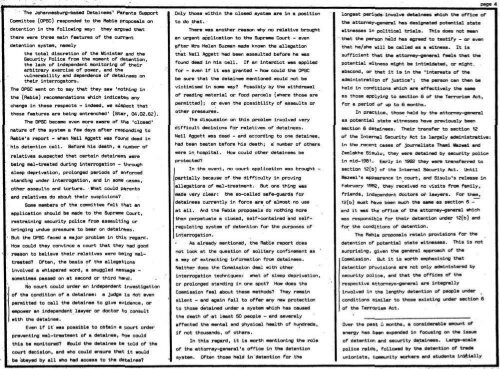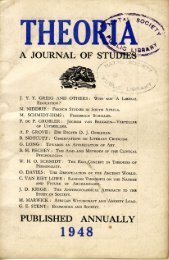You also want an ePaper? Increase the reach of your titles
YUMPU automatically turns print PDFs into web optimized ePapers that Google loves.
• The Johanneaburg-fce&ad Detainees' Porants Support<br />
Committee (OPSC) responded to the Rabie proposals on<br />
detention in tha following way: they argued that<br />
there vara thraa main faaturaa of tha currant<br />
datantlon system, namely<br />
tha total discretion of tha Minister and tha<br />
Security Polica from tha moment of detention,<br />
tha lack of lndapandent monitoring of thalr<br />
arbitrary axarclaa of power, and tha<br />
vulnerability and depandanca of detainees on<br />
thalr interrogators.<br />
Tha OPSC want on to say that they saw 'nothing in<br />
tha (Rabie) recommendations ehlch indicates any<br />
change in these respects - indeed, we suspect that<br />
these features are being entrenched' (SUr, 04.02.62}.<br />
Tha OPSC became even mora aware of the 'closed*<br />
nature of tha system a few days after responding to<br />
Rable's report • whan Nell Aggett was found dead in<br />
his detention call. Before his death, a number of<br />
relatives suspected that certain detainees were<br />
being mal-treated during interrogation - through<br />
sleep deprivation, prolonged periods of enforced<br />
standing under interrogation, and in some cases,<br />
other assaults and torture, what could parents<br />
and raletlvee do about their suspicions?<br />
Some we-faers of the committee felt that en<br />
application should be wade to tha Suprejee Court,<br />
restraining security police from assaulting or<br />
bringing undue pressure to bear on detainers.<br />
But the OPSC faced a major problem in this regard.<br />
How could they convince a court that they had good<br />
reason to believe their reletives were being mal<br />
treated? Often, the basis of tha allegations<br />
involved a whispered word, a smuggled message -<br />
sometimes passed on at second or third hand.<br />
No court could order an independent investigation<br />
of the condition of a detainee: a Judge is not even<br />
permitted to call the detainee to give evidence, or<br />
empower an independent lawyer or doctor to consult<br />
with the detainee.<br />
Even if it" ess possible to obtain a court order<br />
preventing aal-traatment of a detainee, how could<br />
this be monitored? would the detainee be told of the<br />
court decision, and who could ensure that it would<br />
be obeyed by all who had access to the detainee?<br />
Only thoee within the closed system are in a position<br />
to do that.<br />
There was another reason why no reletlve brought<br />
en urgent application to the Supreme Court - even<br />
after Mrs Helen Suzman made known the allegation<br />
that Neil Aggett hed been essaulted before he was<br />
found dead In hie call. If an interdict was applied<br />
for - even If it was granted - how could the OPSC<br />
be sure that tha detainee mentioned would not be<br />
victimised In some way? Possibly by tha withdrawal<br />
of reading material or food parcels (where those are<br />
permitted); or even the possibility of assaults or<br />
other pressures.<br />
The discussion on this problem involved very<br />
difficult decisions for relatives of detainees.<br />
Neil Aggett was dead - and according to one detainee,<br />
had been beaten before his death; a number of others<br />
were in hospital. How could other detainees be<br />
protected?<br />
In the event, no court application was brought -<br />
partially because of the difficulty in proving<br />
allegations of ma1-treatment- But one thing was<br />
made vmry clear: the so-called safe-guards for<br />
detainees currently in force are of almost no use<br />
at all. And the Rabie proposals do nothing more<br />
than perpetuete e closed, self-contained end self-<br />
regulating system of detention for the purposes of<br />
lnterrogetion•<br />
As already mentioned, the Rabie report does<br />
not look at the question of solitary confinement as<br />
a way of extracting information from detainees.<br />
Neither does the Commission deal with other<br />
interrogation techniques: what of sleep deprivation,<br />
or prolonged standing in one spot? How does the<br />
Commission feel about these methods? They remain<br />
silent - and egaln fall to offer any new protection<br />
to those detained under a system which has caused<br />
the death of at least 50 people - and severely<br />
affected the mental and physical health of hundreds,<br />
if not thousands, of others.<br />
•<br />
In this regard, it la worth mentioning the role<br />
of the attorney-general's office in tha detention<br />
system. Often those held in detention far the<br />
longest periods involve detainmes which the office of<br />
the attorney^general has designated potential state<br />
witnesses in political trials. This does not mean<br />
that the person held has agreed to testify - or even<br />
that he/she will be called as a witness. It is<br />
sufficient that the attorney-general feels that tha<br />
potential witness might be intimidated, or might,<br />
abscond, or that it is in the 'interests of the<br />
administration of Justice'; the parson can then be<br />
held In conditions ehlch are effectively the same<br />
as those applying to section 6 of the Terrorism Act,<br />
for s period of up to 6 monthe.<br />
In practice, those held by the ettorney-general<br />
as potential state witnesses have previously been<br />
section 6 detainees. Their transfer to section 12<br />
page 4<br />
of the Internal Security Act Is largely administrative:<br />
In the recent cases of Journalists Themi Unzwal and<br />
Zwelakhe Slsulu, they were detained by security polica<br />
in mid-1961. Early in 1962 they were transferred to<br />
section 12(b) of the Internal Security Act. Until<br />
amswai's appearance in court, and Slsulu's release in<br />
February 1982. they received no visits from family,<br />
friends, lndapandent doctors or lawyers. For them,<br />
12(b) must have been much tha seme as section 6 -<br />
and it was tha office of the attorney-generel which<br />
was responsible for their detention under 12(b) and<br />
for the conditions of detention.<br />
Tha Rabie proposals retain provisions for tha<br />
detention of potential state witnesses. This is not<br />
surprising, given the general approach of the<br />
Commission. But it is worth emphasising that<br />
detention provisions ore not only administered by<br />
security police, and that the offices of tha<br />
respective ettornays-generel are integrally<br />
involved in the lengthy detention of people under<br />
conditions similer to those existing under section 6<br />
of the Terrorism Act.<br />
Over the past 0 months, a considerable amount of<br />
energy has been expended in focusing on the issue<br />
of detention and security detainees. Large-scale<br />
police raids, followed by the detention of trede<br />
unionists, community workers and students initially

















